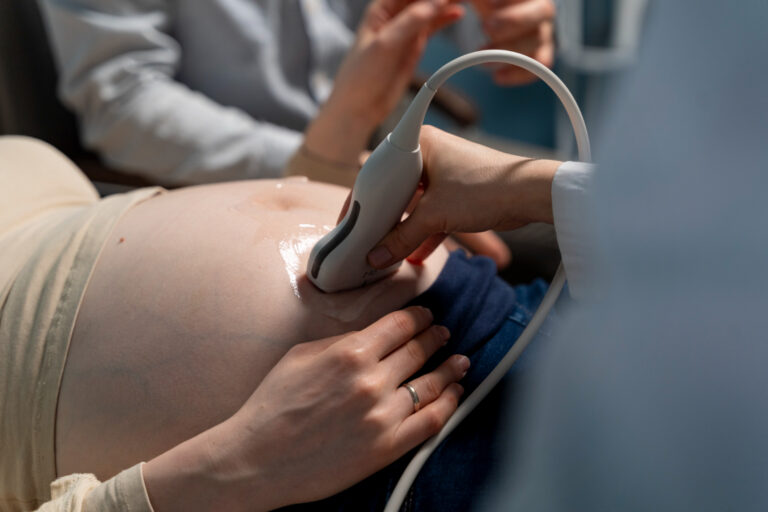Pregnancy marks a critical period in healthcare where timely interventions and continuous monitoring can mean the difference between life and death. As maternal mortality rates continue to challenge healthcare systems worldwide, artificial intelligence emerges as a beacon of hope, offering innovative solutions to age-old problems in maternal care.

Maternal healthcare now can be substantially improved using the latest artificial intelligence technologies. Image credit: Freepik, free license
Is Artificial Intelligence Trying to Help Cure Our Pregnant Women?
The global maternal health crisis demands innovative solutions. In 2020, nearly 287,000 women lost their lives during pregnancy or childbirth, with 95% of these deaths occurring in regions with limited healthcare resources.
While traditional healthcare approaches have made extensive wide-scale strides, artificial intelligence introduces unprecedented capabilities in prediction, prevention, and personalized care that could reshape maternal health outcomes – to a much better degree of quality and cost compared to existing medical solutions.
Machine learning algorithms now process millions of patient records, identifying subtle risk factors that traditional medical assessments might miss. These AI systems create sophisticated risk profiles for each expectant mother, enabling healthcare providers to implement targeted interventions before complications arise. The technology’s ability to learn from each new case continuously improves its predictive accuracy, making it a particularly valuable tool in maternal healthcare.
Healthcare facilities implementing AI-driven maternal care systems report significant improvements in patient outcomes. These systems monitor vital signs, laboratory results, and other clinical data in real-time, alerting healthcare providers to potential problems hours or even days before traditional monitoring methods would detect them.
Artificial intelligence (AI) warning systems have demonstrated significant potential in reducing severe maternal complications by enabling early detection and timely intervention. For instance, at the Area 25 Health Centre in Lilongwe, Malawi, the implementation of an AI-enabled fetal monitoring system led to an 82% reduction in stillbirths and neonatal deaths over a three-year period. This system continuously monitors fetal vital signs during labor, alerting clinicians to any abnormalities and facilitating prompt responses.
Another study by Massachusetts General Hospital described the application of AI methods for risk stratification in obstetrics. By analyzing historical patient data, AI models can predict and recognize risk in patients during labor and delivery, enabling clinical teams to mitigate adverse outcomes effectively.
Transforming Prenatal Care Through AI Innovation
Modern AI systems analyze vast amounts of patient data to detect subtle patterns that might escape human observation. These systems can predict complications like preeclampsia and gestational diabetes weeks before traditional diagnostic methods, enabling preventive interventions that save lives.
Consider how AI impacts daily prenatal care:
Table 1. AI-driven innovations transforming maternal health: applications and impact.
| AI Innovation | Application in Maternal Health | Impact/Benefits | Example/Case Study |
|---|---|---|---|
| Predictive Analytics for Complications | Early prediction of preeclampsia, gestational diabetes, and preterm labor | Early intervention, improved maternal and fetal outcomes | AI models predicting preeclampsia based on EHR data |
| AI-Powered Ultrasound Imaging | Automated analysis of fetal images for detecting anomalies | Increased accuracy and reduced need for specialized radiologists | AI-based tools like Qure.ai for fetal growth monitoring |
| Telemedicine and AI Chatbots | Virtual prenatal consultations and 24/7 AI-based support | Improved access to care, especially in rural/underserved areas | AI chatbots like Ada Health providing maternal care support |
| Wearable Sensors and AI Integration | Monitoring maternal vitals and fetal movements | Real-time health data tracking, personalized care recommendations | AI-integrated wearables for continuous monitoring of vitals |
| AI in Genomic Analysis | Screening for genetic conditions in the fetus | Early detection of potential genetic disorders, better planning | AI-driven genomic analysis platforms for prenatal screening |
| AI-Enhanced Postpartum Care | Mental health monitoring and detection of postpartum depression | Timely intervention reduced maternal mental health issues | AI algorithms identifying early signs of postpartum depression |
AI-powered imaging analysis has revolutionized prenatal screenings, achieving accuracy rates exceeding 97% in detecting specific fetal abnormalities such as still birth and depression diagnostics. These systems process ultrasound images in real-time, providing immediate feedback to healthcare providers and reducing the dependency on specialized radiologists. This technological advancement particularly benefits rural and underserved areas, where access to specialist expertise is often limited.
The integration of AI with electronic health records creates comprehensive pregnancy journey maps, tracking everything from nutritional intake to fetal development patterns. These detailed analyses enable healthcare providers to identify potential risks and adjust care plans proactively, ensuring optimal outcomes for both mother and child.
Mental Health Support Through Digital Innovation
The emotional journey of pregnancy often brings unprecedented challenges. AI systems now serve as 24/7 companions, offering support through various digital platforms.
Advanced natural language processing algorithms now detect subtle changes in communication patterns that might indicate developing mental health concerns. These systems analyze everything from text messages to voice recordings, identifying signs of anxiety or depression with remarkable accuracy. Early detection allows for timely intervention, potentially preventing more severe mental health complications during pregnancy and postpartum periods.
Table 2. Leveraging AI to address maternal mental health challenges.
| AI Solution | Application in Maternal Mental Health | Impact/Benefits | Example/Case Study |
|---|---|---|---|
| AI-Powered Mental Health Screening Tools | Early detection of postpartum depression and anxiety disorders | Enables early intervention and personalized mental health support | AI-based tools like Woebot for detecting postpartum depression |
| Chatbots for Mental Health Support | 24/7 access to emotional support and mental health resources | Provides real-time, anonymous support for new mothers experiencing stress | AI-based chatbots like Wysa for maternal mental health support |
| AI-Driven Predictive Models | Identifying risk factors for maternal mental health conditions | Helps healthcare providers intervene early to prevent severe conditions | Predictive models analyzing risk based on social and clinical data |
| Wearable Devices with AI Integration | Monitoring stress, sleep patterns, and emotional health of new mothers | Offers continuous monitoring and timely alerts for mental health risks | AI-enabled wearables tracking mental health indicators |
| Virtual Cognitive Behavioral Therapy (CBT) | Delivering AI-guided CBT for managing postpartum depression | Provides accessible, cost-effective therapy options for new mothers | AI platforms delivering virtual CBT for postpartum depression |
| Natural Language Processing (NLP) in Counseling | Analyzing speech and text for emotional distress during consultations | Enhances the ability to detect mental health issues during routine checkups | NLP tools identifying emotional distress in verbal communication |
Personalized AI mental health companions adapt their support strategies based on individual user interactions, creating uniquely effective therapeutic relationships. These systems learn from each conversation, adjusting their responses to align with the user’s communication style and emotional needs, providing increasingly relevant and effective support over time.
Breaking Down Healthcare Barriers
AI-powered solutions dramatically improve healthcare accessibility, particularly in underserved communities. Remote monitoring systems enable healthcare providers to track maternal health indicators from afar, while AI-driven diagnostic tools help identify potential complications early. These innovations prove especially valuable in regions where specialized medical care remains scarce.
Mobile health applications powered by AI have become crucial in bridging healthcare gaps, particularly in remote areas. These apps provide real-time translations of medical information into local languages, making maternal health education accessible to diverse populations. The technology adapts its communication style based on users’ literacy levels and cultural contexts, ensuring critical health information reaches and resonates with all expectant mothers.
AI-driven resource allocation systems optimize the distribution of medical supplies and personnel across healthcare networks. These systems analyze population health data, transportation routes, and facility capacities to ensure essential maternal care resources reach the areas of greatest need, maximizing the impact of limited healthcare resources in underserved regions.
Ethical Considerations in AI-Driven Maternal Care
While AI promises revolutionary advances in maternal healthcare, ethical considerations demand attention. Privacy concerns surrounding sensitive medical data, potential algorithmic biases affecting different demographic groups, and the balance between AI assistance and human medical expertise require careful navigation. Healthcare providers must ensure AI tools enhance rather than replace the crucial human elements of maternal care.
The development of culturally sensitive AI systems presents another critical ethical challenge. These systems must recognize and respect diverse cultural practices and beliefs surrounding pregnancy and childbirth while maintaining medical accuracy. Developers are working closely with cultural anthropologists and community leaders to create AI solutions that bridge cultural gaps without compromising healthcare quality.
Ensuring equitable access to AI-powered maternal healthcare technologies requires addressing systemic inequalities in healthcare infrastructure. Organizations are developing innovative funding models and technology deployment strategies to prevent AI healthcare solutions from exacerbating existing healthcare disparities between wealthy and underserved communities.
Future Horizons in AI-Enhanced Maternal Care
The integration of AI with emerging technologies like Internet of Things (IoT) devices and wearable technology opens new frontiers in maternal healthcare. These innovations enable continuous monitoring and early intervention, potentially transforming pregnancy care in both high-resource and underserved settings. As research continues, AI’s role in predicting and improving long-term maternal and child health outcomes grows increasingly significant.
Quantum computing integration promises to revolutionize AI’s capabilities in maternal healthcare. These advanced systems will process complex genomic data and environmental factors simultaneously, creating unprecedented insights into pregnancy outcomes. Early research suggests quantum-enhanced AI could predict pregnancy complications with near-perfect accuracy months before any physical symptoms appear.
The development of AI-powered microbiome analysis systems represents another exciting frontier in maternal health. These technologies analyze the complex relationships between maternal microbiome compositions and pregnancy outcomes, enabling highly personalized dietary and medical interventions that optimize both maternal and fetal health throughout pregnancy.
Conclusion
Artificial intelligence will undoubtedly bring a lot of changes in maternal healthcare and its standard practices, offering solutions to longstanding challenges in accessibility, monitoring, and personalized care. While ethical considerations and implementation challenges require attention, AI’s potential to improve maternal health outcomes worldwide is surely undeniable. As technology advances, the integration of AI in maternal healthcare may help create a future where every expectant mother receives the quality care she deserves, and for every mother in the world.
If you are interested in this topic, we suggest you check our articles:
- AI in Medical Research: Exploring Its Impact and Innovations
- The use of AI Image Recognition in Medicine
- Next-Gen AI Doctors: Movano’s Smart Ring Lets You Talk to AI Chatbot EvieAI
Sources: National Library of Medicine, The Guardian, Society for Maternal-Fetal Medicine, Massachusetts General Hospital, Technology Networks, Science Direct

